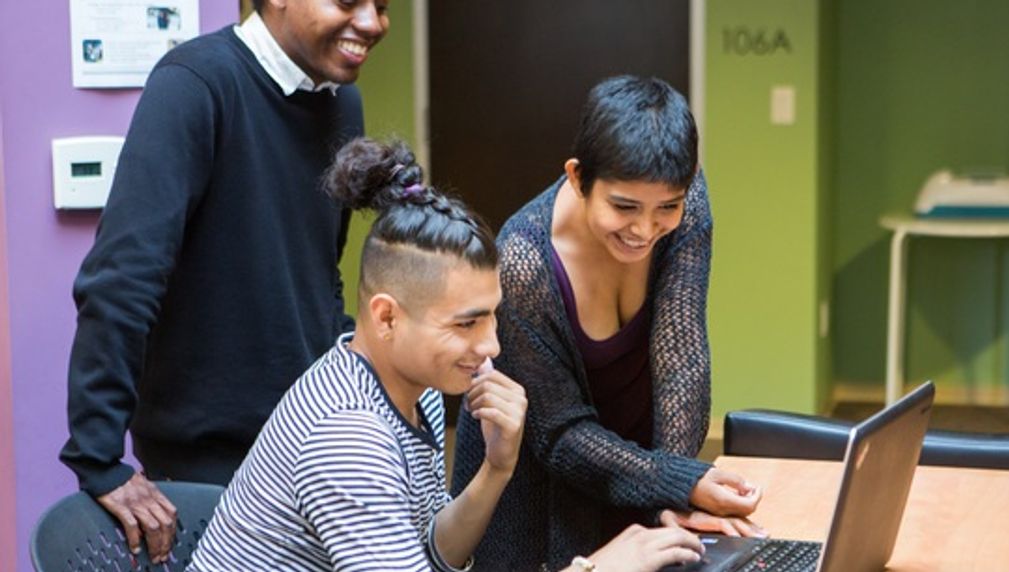First Place: Providing at-risk foster youth with the skills they need to be college and career ready
First Place for Youth provides at-risk foster youth, ages 18 to 24, with intensive education and employment support so that they can improve their lives and become self-sufficient.

Are any other organizations collaborating on this proposal?
Art + Practice Foundation (A+P) is an arts and education private operating foundation based in Leimert Park.
Please describe your project proposal.
First Place provides at-risk foster youth, ages 18 to 24, with intensive education and employment support so that they can become self-sufficient. First Place will expand our program operations, currently located in Koreatown, and launch a new satellite office within the A+P Campus. By providing outcomes-driven services to more youth in need, First Place can push for higher standards through our leadership in the field and change the way that youth are treated within the foster care system.
Which of the LEARN metrics will your proposal impact?
College matriculation rates
District-wide graduation rates
Student education pipeline
Youth unemployment and underemployment
In what areas of Los Angeles will you be directly working?
Central LA
South LA
South Bay
Describe in greater detail how your proposal will make LA the best place to LEARN?
First Place will help make LA the best place to learn by providing foster youth with the skills they need to be college and career ready. The First Place program is designed to achieve the following objectives: 1) Youth make important progress in their educational attainment by finishing high school and enrolling in college; 2) Youth improve their economic security by increasing their job skills and career readiness; and 3) Youth are provided access to safe housing, which allows them to focus on strengthening the self-sufficiency skills needed to be an independent adult.
Youth growing up in foster care are among LA County’s most at-risk populations. These are young people who experience trauma and neglect within their families. As these young people grow older, many struggle to succeed in school and find work, and have yet to develop critical self-sufficiency skills. A 2014 study by the National Working Group on Foster Care and Education found that 85 percent of foster youth say they want to go to college, but only 49 percent of foster youth graduate high school and only 20 percent enroll in a postsecondary program. First Place helps youth reduce high-risk behaviors and build the critical skills needed to live a healthy, independent life. Last year in Los Angeles, 97 percent of youth were attending school or employed within six months of entering the First Place program.
Youth participants are each assigned both a Youth Advocate (Master’s Level Social Worker) and an Education and Employment Specialist (EE). Specific support services include:
* Intensive Case Management: Weekly Youth Advocate meetings are a critical opportunity to develop individual goals in the areas of education, employment, health, and personal relationships.
* Intensive Education Support: EE’s support youth in completing their high school diploma or GED certificate and, once eligible, enrolling in college. EE’s provide in-depth assessments and academic tutoring (as needed), and youth participate in ongoing education activities that prepare them to enroll in college. Youth enrolled in college receive support in course selection and identifying critical on-campus resources for financial aid and academic support.
* Intensive Employment Support and Career Exploration: With the support of their EE, young people gain skills around employment readiness and success in the workplace, and they have the opportunity to explore careers and select a career path. Youth receive support around job training and retention, goal setting, and building work readiness skills.
* Linked Learning Opportunities: First Place’s linked learning opportunities are focused on nine distinct career pathways (Health Care, Human Services, Hospitality, Law Enforcement, Logistics, Business, Green Tech, Office Administration, and Media Arts), all of which offer youth the opportunity to receive an industry-recognized certificate and can lead to a living-wage career.
Please explain how you will define and measure success for your project.
First Place demonstrates that with the right guidance and support, at the right time, foster youth can defy the odds that are so stacked against them and reach their full potential in school, work, and life. In the coming year, First Place will expand in Los Angeles County by almost 40 percent (from 145 to 200 youth), and we expect youth to meet the following positive education and employment outcomes:
* 70 percent of youth will receive their high school diploma or GED certificate, or will be actively pursuing their high school diploma or equivalent.
* 80 percent of eligible youth will successfully enroll in post-secondary education.
* 70 percent of youth will obtain employment, and/or realize a wage increase or promotion.
First Place has a customized performance management database that allows us to collect a variety of quantitative and qualitative data to track the progress of participants across four primary domains: education, employment, housing, and healthy living. Data tracked includes: school attendance, education progress, employment status, income, avoidance of risky behaviors, etc. We also administer outcome surveys when a participant exits the program, and then again at six months and 12 months post-exit. First Place’s Evaluation and Learning Department analyzes program data in real-time to identify trends among our youth, and effectively improve interventions and program delivery.
How can the LA2050 community and other stakeholders help your proposal succeed?
Money
Advisors/board members
Publicity/awareness
Community outreach
Network/relationship support